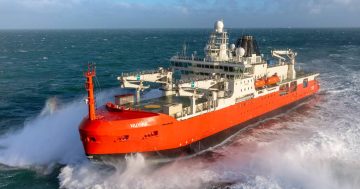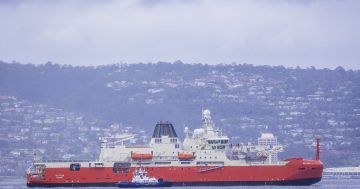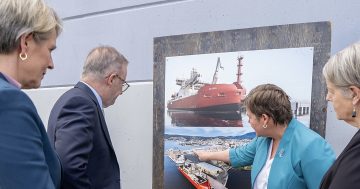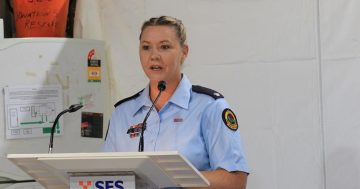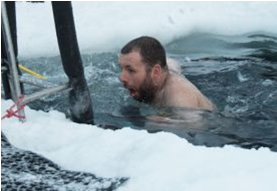
Scott Clifford celebrates Midwinter Day with an icy dip (Photo: George Brettingham-Moore)
Australian expeditioners in Antarctica have celebrated ‘Midwinter Day’ (21 June) with a freeze-all plunge into the icy sea off Casey Research Station.
Leader at the Station, Rebecca Jeffcoat said the temperature was hovering around minus 22ºC and the water nearly -2ºC when the hardy expeditioners took their dips.
Ms Jeffcoat said Midwinter Day was the most anticipated occasion on the Antarctic calendar and had been celebrated from the time of the early explorers, such as Sir Douglas Mawson, right through to modern-day expeditioners.
“Swimming in Antarctica’s below freezing waters is something of a mad tradition, but our hardy expeditioners look forward to it, with 21 of the 26 people on station brave enough to take an icy dip this year,” Ms Jeffcoat said.
“Midwinter Day is really important in Antarctica because it marks the halfway point of our year here on the ice and it means the sun will spend slightly longer in the sky each day.”
She said midwinter celebrations at Australia’s three Antarctic research stations and sub-Antarctic Macquarie Island include a feast, exchange of handmade gifts, a midwinter play and messages from home with celebrations also taking place at the Australian Antarctic Division’s headquarters in Tasmania.
The Day also saw the presentation of Australian Antarctic Medals to one station leader, two pilots and a fisheries observer in recognition of their service to the Australian Antarctic Program.
Governor-General, Sir Peter Cosgrove announced the special Honours List for Midwinter Day and the medals were presented to Graham Cook, Australian Antarctic Station leader since 2004; Garry Studd, senior Skytraders pilot for the past 12 seasons; John Oakes, Antarctic helicopter pilot; and fisheries observer Martin Tucker, who has completed 31 voyages in the Southern Ocean.
The Australian Antarctic Medal was established in 1987, replacing the Imperial Polar Medal and its variations, which date back to 1857, for service in the Arctic and Antarctic regions.




